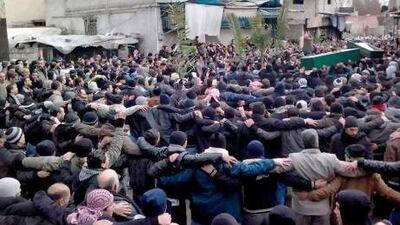Egypt's foreign ministry said yesterday that it was withdrawing its ambassador to Syria, the latest Arab country to scale back its relations with the embattled regime in Damascus.
The Egyptian state news agency, Mena, said that the foreign minister, Mohammed Amr, decided yesterday to keep the ambassador to Syria, Shukri Ismael, in Cairo until further notice.
The decision, which follows moves by Tunisia, Libya, Qatar and Saudi Arabia, to reduce ties with Damascus came on a day in which gunmen fired on a car carrying a senior Syrian state prosecutor and a judge in the north-west province of Idlib, killing both of them and their driver, according to the state news agency.
Syrian military defectors waging an armed struggle against President Bashar Al Assad's forces control parts of Idlib province, which borders Turkey. It has been one of the regions hardest hit by the government during the 11-month-old uprising against Mr Al Assad's regime.
State news agency, Sana, said the Idlib provincial state prosecutor, Nidal Ghazal, and Judge Mohammed Ziadeh were killed in the attack.
The Syrian government blamed armed "terrorists" for the uprising and said they are carrying out a foreign conspiracy to destabilise the country.
Clashes between military rebels and Syrian forces are growing more frequent and the defectors have managed to take control of small pieces of territory in the north and in Homs province.
The increasing militarisation of the conflict is pushing Syria to the brink of a civil war.
The Local Coordination Committees, an anti-Assad group, said more than 7,300 have been killed since March of last year. There is no way to independently verify the numbers, however, as Syria bans almost all foreign journalists and human-rights organisations.
In other violence yesterday, activists reported that security forces shelled rebel-held areas in the city of Homs.
The Britain-based Syrian Observatory for Human Rights said forces continued to shell the Homs neighbourhood of Baba Amr, which has been under government attack since February 4.
The rights group, which has activists throughout Syria, said 23 buses full of troops along with military vehicles and ambulances were seen heading from Damascus towards Homs.
The group also said troops stormed the eastern town of Sukhna searching for members of the opposition, and that one woman was shot dead during the raids. It said two other people were killed by troops in the eastern province of Deir El Zour and the village of Atareb.
Activist groups called a one-day strike in Damascus to express support for other cities in revolt. But the call did not appear to have been widely heeded.
Residents in the capital said businesses were open as usual and so were schools and universities.
Calls for strikes in the past did not succeed in tightly controlled Damascus, where government forces and informers keep a close eye on all activities.
Earlier yesterday, a funeral was held in Damascus for a man who was killed a day earlier when security forces fired live rounds and tear gas at thousands of people marching in a funeral procession that turned into one of the largest protests in the capital.
The economy is being crippled by foreign sanctions and the government is "slowly disintegrating" under anti-regime protests, a leading Syrian businessman told the BBC yesterday.
Faisal Al Qudsi, the son of a former Syrian president who was heavily involved in the country's economic liberalisation, said sanctions were affecting the entire country, not just Mr Al Assad's regime.
"The apparatus of the government is slowly disintegrating and it's almost non-existent in trouble spots like Homs, Idlib, Deraa," he told the BBC.
"Courts are not there. Police are not interested in any sort of crime and it is affecting the government very, very badly, every day it continues."
Also, yesterday, the Philippines said it did not take part in a United Nations vote on a resolution calling on Mr Al Assad to step down as it seeks Syria's help in moving Filipinos from the country.
The UN General Assembly voted overwhelmingly on Thursday in favour of a resolution backing an Arab League plan calling on Mr Assad to step down and strongly condemning human-rights violations by his regime.
The foreign secretary, Albert del Rosario, said yesterday that the Philippines' main concern was to repatriate thousands of Filipinos in Syria through the help of its government.
* With additional reporting by the Associated Press and Agence France-Presse

